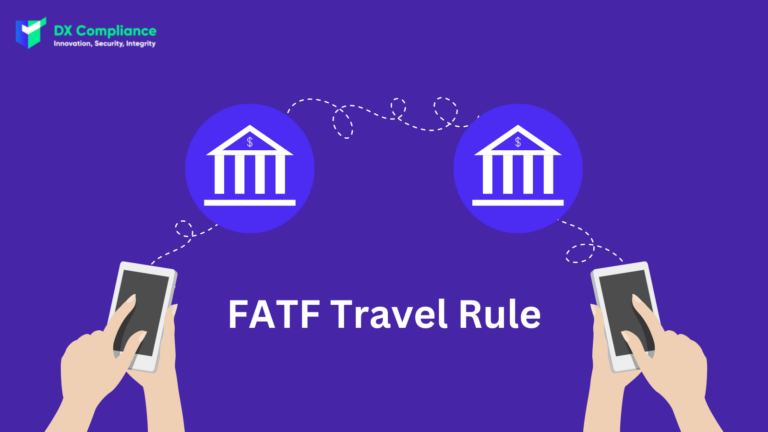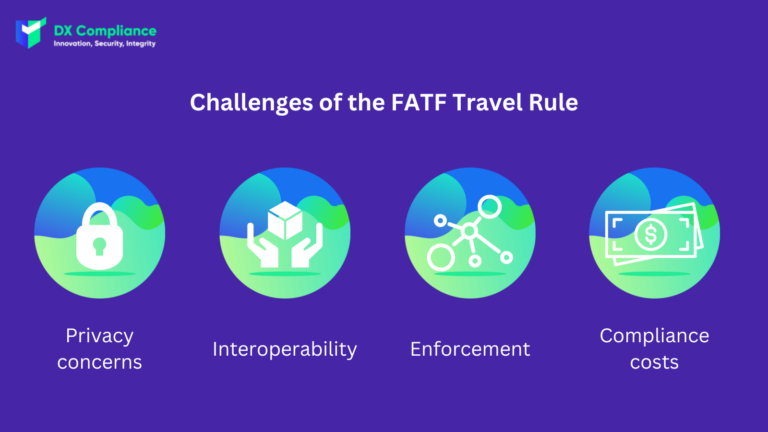4 January 2023, 11:01
Tagline
4 January 2023, 11:01
Tagline
The Financial Action Task Force (FATF) travel rule is a requirement in the compliance framework of certain financial institutions, including virtual asset service providers (VASPs), to collect and transmit certain information about the sender and recipient of virtual assets when those assets are transferred between VASPs. The travel rule aims to help combat money laundering and terrorist financing by providing a means for law enforcement agencies to trace the flow of virtual assets and identify suspicious activity.
Under the travel rule, VASPs are required to collect and transmit the following information about a transaction:
VASPs are also required to maintain records of this information for a certain period of time, typically five years. The travel rule applies to virtual asset transfers that exceed a certain threshold, which varies by jurisdiction.

The Financial Action Task Force (FATF) travel rule applies to virtual asset service providers (VASPs), which are defined as entities that conduct virtual asset transactions on behalf of their customers. VASPs include exchanges, wallet providers, and other firms that facilitate the transfer of virtual assets between parties.
The travel rule applies to VASPs when virtual assets are transferred between VASPs. This includes both domestic and international transfers of virtual assets. The travel rule does not apply to transfers of virtual assets between individuals or between an individual and a VASP.
The travel rule is an important part of the compliance framework for virtual asset service providers (VASPs) because it helps to combat money laundering and terrorist financing. Money laundering is the process of disguising the proceeds of criminal activity as legitimate funds, while terrorist financing refers to the act of providing financial support to terrorists or terrorist organizations. Both activities can have serious consequences and can threaten the stability and integrity of financial systems.
The travel rule helps to combat these activities by providing a means for law enforcement agencies to trace the flow of virtual assets and identify suspicious activity. By requiring VASPs to collect and transmit certain information about the sender and recipient of virtual assets when they are transferred between VASPs, the travel rule helps to create a trail of information that can be used to investigate and prosecute individuals or organizations involved in illegal activities.
In addition to its role in combating money laundering and terrorist financing, the travel rule is also important because it helps to build trust and confidence in the virtual asset industry. By ensuring that VASPs are adhering to appropriate standards and controls, the travel rule helps to promote the integrity and transparency of virtual asset transactions.
The implementation and enforcement of the travel rule for virtual asset transactions vary among different jurisdictions. Some countries have implemented specific regulations or guidelines for VASPs to follow in order to comply with the travel rule, while others have left it to the VASPs to develop their own compliance programs.
In general, the level of compliance with the travel rule among VASPs is thought to be mixed. Some VASPs may have robust compliance programs in place, while others may not be fully compliant. It is also possible that some VASPs may not be aware of their obligations under the travel rule, or may not have the necessary systems and processes in place to comply with it.
Enforcing compliance with the travel rule can be challenging, as it requires close collaboration between VASPs, financial institutions, and law enforcement agencies. It is also important to consider the potential impact on user privacy and the need to balance this with the need for effective anti-money laundering and terrorist financing controls.
In the United Kingdom, the FATF travel rule is implemented through the Money Laundering, Terrorist Financing and Transfer of Funds (Information on the Payer) Regulations 2017. These regulations require virtual asset service providers (VASPs) to collect and transmit certain information about virtual asset transactions when virtual assets are transferred between VASPs. The regulations apply to virtual asset transfers that exceed a threshold of £1,000 (GBP).
In Ireland, the FATF travel rule is implemented through the Criminal Justice (Money Laundering and Terrorist Financing) Act 2010 and the European Union (Anti-Money Laundering: Beneficial Ownership of Corporate Entities) Regulations 2019. These regulations require VASPs to collect and transmit certain information about virtual asset transactions when virtual assets are transferred between VASPs. The regulations apply to virtual asset transfers that exceed a threshold of €1,000 (EUR).
In the United Arab Emirates (UAE), the FATF travel rule is implemented through the Central Bank of the UAE’s Regulatory Framework for Stored Values and Electronic Payment Systems (FRAMEWORK). This framework requires VASPs to collect and transmit certain information about virtual asset transactions when virtual assets are transferred between VASPs. The FRAMEWORK applies to virtual asset transfers that exceed a threshold of AED 30,000 (UAE dirhams).

The travel rule for virtual asset service providers (VASPs) can present several challenges in terms of implementation and enforcement. Some of these challenges include:
The travel rule requires VASPs to collect and transmit personal information about the sender and recipient of virtual assets, which can raise privacy concerns. It is important for VASPs to balance the need for effective anti-money laundering and terrorist financing controls with the need to protect the privacy of their customers.
The travel rule requires VASPs to transmit information about virtual asset transactions to other VASPs. However, there is currently no standardized format for transmitting this information, which can make it difficult for VASPs to exchange information in a consistent and reliable way.
Implementing and maintaining compliance with the travel rule can be costly for VASPs, especially for smaller firms with limited resources. VASPs may need to invest in new systems and processes, as well as hire additional staff to ensure compliance with the travel rule.
Ensuring compliance with the travel rule can be challenging, as it requires close collaboration between VASPs, financial institutions, and law enforcement agencies. It is also important to consider the potential impact on user privacy and the need to balance this with the need for effective anti-money laundering and terrorist financing controls.
Financial institutions, including virtual asset service providers (VASPs), can comply with the Financial Action Task Force (FATF) travel rule by implementing appropriate policies, procedures, and controls to collect and transmit the required information about virtual asset transactions.
To comply with the travel rule, financial institutions should:
It is important for financial institutions to be proactive in complying with the travel rule and to seek guidance as needed to ensure that they are in compliance with the relevant requirements.
DX Compliance is an AML and Compliance firm helping our clients identify, prevent and report financial crime. DX Compliance help Banks, FinTech’s and Payments Providers to continually monitor their risk and detect the threat of money laundering to ensure compliance and reduce fines.
Transaction Monitoring as an efficient and powerful AML system identifies the information by using AI and other AML technologies. In this way, transaction data can be automatically captured and transaction monitoring can be improved. In addition to reducing false alarms, more detailed information is obtained to assess whether a suspicious payment is present.
Our anti-money laundering AML software help financial institutions, including virtual asset service providers (VASPs), comply with the Financial Action Task Force (FATF) travel rule by automating the process of collecting and transmitting the required information about virtual asset transactions.
It is configured to automatically collect and transmit the needed information about a transaction when virtual assets are transferred between VASPs. It can also be used to maintain records of this information for a period of at least five years, as required by the travel rule.
By automating the process of collecting and transmitting the required information, our DX software helps VASPs to comply with the travel rule more efficiently and reduce the risk of non-compliance. It is important for VASPs to carefully consider their specific compliance needs and to select AML software that is suitable for their operations.
Curious? Get in touch with our experts!

08.08.2022
An overview of recent AML developments in the UAE.
Get access
15.10.2021
The introduction of 6AMLD regulations aims to reduce financial crimes.
Get access
27.07.2021 AML Compliance
Uncovering the PEP and Sanctions Lists and Global Regulation
Get access